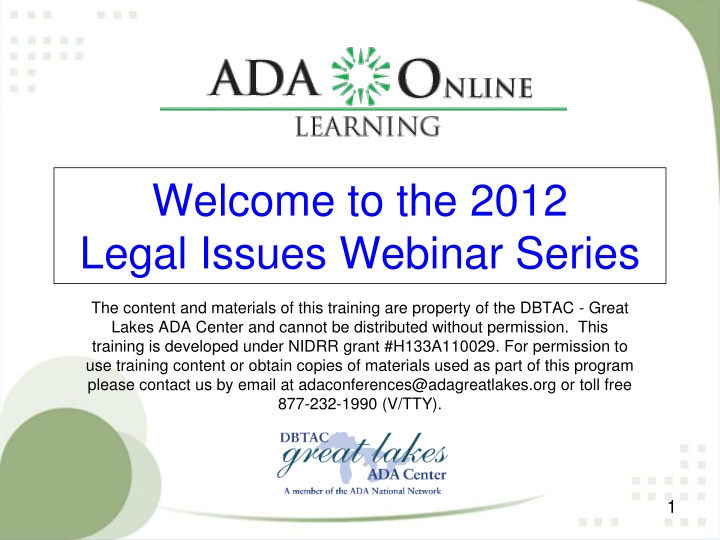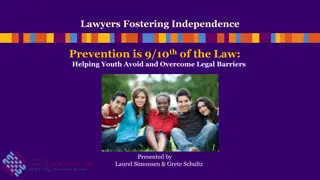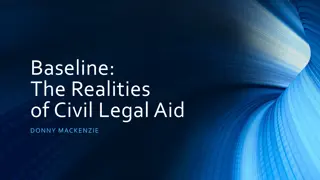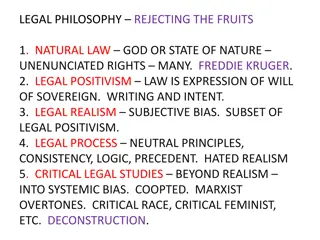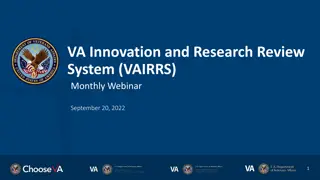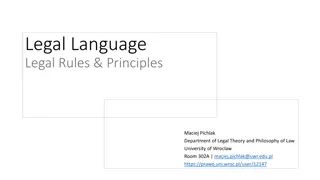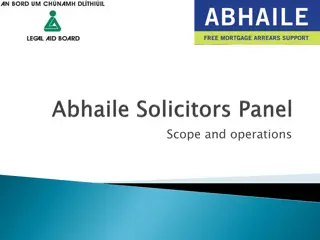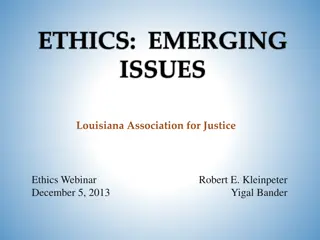Legal Issues Webinar Series 2012
The Legal Issues Webinar Series for 2012, hosted by the DBTAC - Great Lakes ADA Center, covers topics on confidentiality under the ADA and other laws. It includes discussions on continuing legal education credits for Illinois attorneys, with valuable insights shared by legal experts. Participants can engage through closed captioning features and submit questions during the session.
Download Presentation

Please find below an Image/Link to download the presentation.
The content on the website is provided AS IS for your information and personal use only. It may not be sold, licensed, or shared on other websites without obtaining consent from the author.If you encounter any issues during the download, it is possible that the publisher has removed the file from their server.
You are allowed to download the files provided on this website for personal or commercial use, subject to the condition that they are used lawfully. All files are the property of their respective owners.
The content on the website is provided AS IS for your information and personal use only. It may not be sold, licensed, or shared on other websites without obtaining consent from the author.
E N D
Presentation Transcript
Welcome to the 2012 Legal Issues Webinar Series The content and materials of this training are property of the DBTAC - Great Lakes ADA Center and cannot be distributed without permission. This training is developed under NIDRR grant #H133A110029. For permission to use training content or obtain copies of materials used as part of this program please contact us by email at adaconferences@adagreatlakes.org or toll free 877-232-1990 (V/TTY). 1
Webinar Features Closed captioning click CC icon (top of screen) or control-F8 and adjust your screen. Questions - type and submit questions in the Chat Area Text box or press control-M and enter text in the Chat Area. Please do not use emoticons or hand- raising features during this session. 2 (877) 232 1990 (V/TTY) http: //www.ada-audio.org
Confidentiality Under the ADA and Other Laws Presented by: Barry Taylor, Legal Advocacy Director, Equip for Equality Alan Goldstein, Senior Attorney, Equip for Equality Valuable assistance provided by Joseph Schwartz May 16, 2012 3
Continuing Legal Education Credit for Illinois Attorneys This session is eligible for 1.5 hours of continuing legal education credit for Illinois attorneys. Illinois attorneys interested in obtaining continuing legal education credit should contact Barry Taylor at: barryt@equipforequality.org This slide will be repeated at the end. (877) 232 1990 (V/TTY) http: //www.ada-audio.org 4
Confidentiality Under the ADA and Other Laws Query: How many participants today are - A. Advocates for people with disabilities B. Represent employers or other covered entities C. Innocent, unbiased bystanders (877) 232 1990 (V/TTY) http: //www.ada-audio.org 5
Confidentiality Under the ADA and Other Laws Confidentiality Under ADA Title I Confidentiality Under ADA Titles II & III, Rehabilitation Act, Civil Rights Act, and Fourteenth Amendment Confidentiality Under Other Laws GINA HIPAA State Laws For more information, pleas see DBTAC: Great Lakes ADA Center Brief on Medical Inquiries available at: www.adagreatlakes.org/Publications (877) 232 1990 (V/TTY) http: //www.ada-audio.org 6
Confidentiality: ADA Statute and Regulations ADA Statute: Information obtained regarding the medical condition or history of the applicant must be collected and maintained on separate forms and in separate medical files and treated as a confidential medical record, except that (i) supervisors and managers may be informed regarding necessary restrictions on the work or duties and necessary accommodations; (ii) first aid and safety personnel.. when appropriate; and (iii) government officials investigating compliance 42 U.S.C. 12112(d)(3)(B). Regulations: Confidentiality applies to: entrance exams; medical exams; and info for voluntary health programs.29 C.F.R. 1630.14. (877) 232 1990 (V/TTY) http: //www.ada-audio.org 8
Confidentiality: EEOC Guidance Confidentiality applies to all medical information, including information related to reasonable accommodation requests. Employers must obtain a release to speak to an employee s doctor. The release should be clear as to what information will be requested. Medical information may be given to appropriate decision-makers involved in the hiring process on a need-to-know basis. Medical information can be shared with third parties as part of the reasonable accommodation process but must be kept confidential. Confidentiality must be maintained even after employment or the application process ends. EEOC Guidance on Reasonable Accommodation and Undue Hardship Under the ADA, found at: www.eeoc.gov/policy/docs/accommodation.html; EEOC Enforcement Guidance: Pre-employment Disability- Related Questions and Medical Examinations, found at: www.eeoc.gov/policy/docs/preemp.html. 9 (877) 232 1990 (V/TTY) http: //www.ada-audio.org
Confidentiality: Who is Protected? Generally, an applicant or employee does not have to meet the ADA s definition of disability to claim the confidentiality protections. See, e.g., Giaccio v. City of New York, 502 F.Supp.2d 380 (S.D.N.Y. 2007); Cossette v. Minn. Power & Light, 188 F.3d 964 (8th Cir. 1999). Unlike other ADA provisions, Examination and Inquiry provision speaks of applicants and employees, not qualified individuals with disabilities. 42 U.S.C. 12112(d)(4) Most courts follow this principle, but some do require proof of disability. Roe v. Cheyenne Mountain Conference Resort, 124 F.3d 1221 (10th Cir. 1997) It makes little sense to require an employee to demonstrate that he has a disability to prevent his employer from inquiring as to whether or not he has a disability. (877) 232 1990 (V/TTY) http: //www.ada-audio.org 10
Confidentiality: Tangible Injuries However, employees do have to show a tangible injury Does not have to be economic (e.g., termination or inability to find other jobs). Can be emotional (e.g., harassment or emotional distress). EEOC v. Ford Motor Credit Co., 531 F. Supp. 2d 930, 941 (M.D. Tenn. 2008) Shame, embarrassment, and depression are tangible injuries. (877) 232 1990 (V/TTY) http: //www.ada-audio.org 11
What Information is Protected? Employer-Mandated vs. Voluntary Disclosure Issue: Was disclosure voluntary or in response to employer inquiry? Employer Inquiries Include: Requirements for leave under the FMLA or ADA. Medical inquiries and examinations of applicants or employees. Fitness for duty exams assessing ability to perform essential job functions. Other mandatory requests for information. Medical support for reasonable accommodation requests (usually) Re-disclosure permitted on a need to know basis. Voluntary Disclosures Include: Almost everything else. E.g., casual discussions and disclosures not in response to formalized, mandatory requests for information ( How are you feeling? ). (877) 232 1990 (V/TTY) http: //www.ada-audio.org 12
What Information is Protected from Disclosure? One Court s Summary Sherrer v. Hamilton Cnty. Bd. of Ed., 747 F. Supp. 924 (S.D. Ohio Sept. 24, 2010) Summarizes case law: Courts have allowed claims of illegal disclosure of confidential medical information to proceed . . . when . . . a supervisor probed an employee for medical information or conditioned the employee s job accommodation or medical leave on the employee s provision of medical information to the supervisor. When the employee has volunteered the information to a supervisor absent a request for medical information, courts have granted summary judgment to the defendant. (877) 232 1990 (V/TTY) http: //www.ada-audio.org 13
What Information is Protected from Disclosure? - Need for FMLA Leave EEOC v. Ford Motor Credit Co., 2008 WL 152780 (M.D. Tenn. Jan. 14, 2008) Employee living with HIV disclosed HIV status to his supervisor as he needed intermittent FMLA leave or a modified schedule as an ADA reasonable accommodation to participate in a clinical trial. Supervisor re-disclosed condition to his HIV to his co-workers causing him shame, humiliation, and depression. Court: Disclosure was not voluntary - pre-requisite to receive leave. Doe v. U.S.P.S.,317 F.3d 339 (D.C.Cir. 2003) HIV status disclosed in request for FMLA leave is confidential. Therefore, co-workers should not have learned of the condition. Note: Info sought in FMLA form constituted a medical inquiry under ADA. Fisher v. Harvey, No. 1:05-cv-102, 2006 WL 2370207 (E.D. Tenn. Aug. 14, 2006) Violation when supervisor required a dr. s note for missed work and left the forms in the break room. (877) 232 1990 (V/TTY) http: //www.ada-audio.org 14
What Information is Protected from Disclosure? Reasonable Accommodation Info Blanco v. Bath Iron Works Corp., 802 F.Supp.2d 215 (July 6, 2011) Plaintiff disclosed ADHD when requesting a reasonable accommodation. Plaintiff did not disclose condition on the post-offer medical questionnaire. In-house physician mentioned the omission to management and plaintiff s employment was terminated. Court: ADA confidentiality applies to disclosure to outsiders and intra- company disclosures. Possible ADA violation by physician as disclosure was not necessary for company managers to accommodate plaintiff. Note: Decision holds that the ADA protects even false medical information: There is no prevarication exception to the ADA s confidentiality... See also, Medlin v. Rome Strip Steel Co., Inc., 294 F.Supp.2d 279 (N.D.N.Y. December 10, 2003) (results from Functional Capacity Evaluation (FCE) are confidential). (877) 232 1990 (V/TTY) http: //www.ada-audio.org 15
Maintenance of Reasonable Accommodation Info Cripe v. Mineta, 2006 WL 1805728 (D.D.C. June 29, 2006) Facts: Attorney of an employee living with HIV sent a letter to the employer regarding work accommodations (information was demanded by employer). Employer failed to keep the letter confidential (the letter was sitting on a desk without an envelope) As a result other employees learned of the plaintiff s HIV status. Court:Rejected employer s argument that the information did not have to be protected since it was not marked as confidential. Note: Once a company gets medical information, it must be properly maintained. (877) 232 1990 (V/TTY) http: //www.ada-audio.org 16
What Information is Protected from Disclosure? Voluntary Disclosure Sherrer v. Hamilton Cnty. Bd. of Ed., 747 F. Supp. 924 (S.D. Ohio Sept. 24, 2010) Employee disclosed breast biopsy when supervisor noted her filling out an unrelated medical form and asked, Is everything okay? Court: Voluntary - FMLA or ADA rights not predicated on disclosure. See also, EEOC v. Thrivent Financial for Lutheran, 795 F.Supp.2d 840 (June 15, 2011) (Employee informed supervisor of migraines after missing work and being told, Give us a call. We need to know what s going on. Deemed voluntary and not protected.) Wiggins v. DaVita Tidewater, LLC, 451 F. Supp. 2d 789 (E.D. Va. 2006) Medical technician experienced a panic attack at work and was subsequently diagnosed with bipolar disorder. Gave her doctor permission to inform her supervisor. When employee returned to work, coworkers knew of her diagnosis. Court: Confidentiality is not protected - voluntary disclosure. (877) 232 1990 (V/TTY) http: //www.ada-audio.org 17
What Information is Protected from Disclosure? Voluntary Disclosure EEOC v. C.R. England, Inc., 644 F.3d 1028 (10th Cir. 2011) Former driver/trainer voluntarily disclosed HIV status to HR. Employer required that Plaintiff inform potential trainees of his condition. In response, Plaintiff suggested drafting a form for trainees. Eventually terminated for performance issues. Court: No ADA violation as HIV status was voluntarily disclosed. Requiring info to be disclosed to trainees was not an adverse employment action. No showing of harm to Plaintiff. Pointed out that a mandatory co-worker consent policy may be unlawful in other circumstances. But see, Mahran v. Benderson Development Company, 2011 WL 2038574 (May 24, 2011) (confidentiality claim allowed to proceed when plaintiff did not claim there was an adverse employment action Court also said that EEOC exhaustion was not required). (877) 232 1990 (V/TTY) http: //www.ada-audio.org 18
What Information is Protected from Disclosure? Voluntary Disclosure Kingston v. Ford Meter Box Co., 2009 WL 981333 (N.D. Ind. Apr. 10, 2009). Supervisor tells employee that he must spend more time on plant floor. Employee informs supervisor that he has COPD. Prior to a meeting with supervisor and company nurse to discuss accommodations, the employer shares condition with coworkers. Court: No confidentiality as it was a voluntary disclosure, was not in response to inquiry about ability to perform job functions. Timing was key disclosure was before accommodations meeting and was not required. That [plaintiff] was in the midst of invoking his statutory rights doesn t transform a voluntary disclosure into one that resulted from an employer inquiry. [Plaintiff] wasn t required to make the initial disclosure Note: The Court could have decided differently as the initial disclosure was in response to a question regarding performance of job duties. (877) 232 1990 (V/TTY) http: //www.ada-audio.org 19
What Information is Protected from Disclosure? Need to Know Basis Note: There are two aspects Initial disclosure & subsequent re-disclosure. Lee v. City of Columbus, 2011 WL 611904 (6th Cir. Feb. 23, 2011) Supervisor has a need to know why an employee was on sick leave. O Neal v. City of New Albany, 293 F.3d 998 (7th Cir. 2002) OK for doctor to disclose exam results to a local pension board as it had to certify the plaintiff s examination for the hiring process. Tucker v. CAN Holdings, Inc.,2008 WL 5412829 (W.D. Ky. Dec. 30, 2008) At a work-related exam, employee disclosed a childhood medical condition requiring a corrective device. When she injured her back, the employer sent an e-mail to all employees worldwide describing the employee s medical condition. Court: Employee medical information must be treated as confidential and only disclosed for special work-related reasons. (877) 232 1990 (V/TTY) http: //www.ada-audio.org 20
What Information is Protected from Disclosure? Drug Test Giaccio v. City of New York, 502 F.Supp.2d 380 (S.D.N.Y. 2007) Plaintiff was employed as a boilermaker by the N.Y. Department of Transportation and was subject to random drug tests. Plaintiff tested positive for marijuana on two occasions and was placed on medical leave without pay, and then returned to full duty. The last positive test was June 24, 2003. Following a Staten Island Ferry accident in November 2003, the results of Plaintiff s prior drug tests were leaked to the press. Court: The newspaper article created an inference that confidential drug testing records were disclosed by a city official in violation of the ADA. No evidence that Plaintiff was addicted to drugs. However, Plaintiff could not establish any adverse employment action or damages, so the case was dismissed. (877) 232 1990 (V/TTY) http: //www.ada-audio.org 21
EAP Programs Need to Know Basis EEOC Enforcement Guidance on Disability-Related Inquiries, http://www.eeoc.gov/policy/docs/guidance-inquiries.html An Employee Assistance Program (EAP) counselor may ask employees about their medical condition(s) if s/he: (1) does not act for or on behalf of the employer; (2) is obligated to shield any information the employee reveals from decision makers; and, (3) has no power to affect employment decisions. (877) 232 1990 (V/TTY) http: //www.ada-audio.org 22
EAP Programs Need to Know Basis Barger v. Bechtel BWXT Idaho LLC, 2008 WL 4411441 (D. Idaho Sept. 25, 2008) Employer insisted employee with stress-related issues, including anxiety and insomnia, see EAP Dr. Dr. recommended discharge to the Personnel Action Advisory Group. Court: Employer did not violate the ADA when the Co. Dr. disclosed exam results to PAAG (employee has an explosive temperament. ) Need-to-know exception applies managers and supervisors may be informed on necessary restrictions. Only shared general job-related observations. Query: Did EAP doctor actually only share information about necessary restrictions and general job-related observations. Please Vote: A. Yes B. No (877) 232 1990 (V/TTY) http: //www.ada-audio.org 23
Confidentiality Regarding the Accommodation Need to Know Basis EEOC v. ESAB Group, Inc., 208 F.Supp.2d 827(N.D. Ohio Feb. 19, 2002) Employer posted a schedule available to the HR dept. and those with a need to know containing designations such as ADA (accommodations) and DIS ( non-occupational disability ). One employee with diabetes began being harassed by co-workers due to perceived preferential treatment, including threats of violence. Referred to ADA designation as American Dickhead Association. Also, a company nurse disclosed diabetes to a co-worker. Court: Information was not confidential. Did not follow EEOC Guidance holding that information regarding the accommodation does not fit into one of the three confidentiality categories. Tip:Even though found lawful, this is probably not a best practice. Note: EEOC is very interested in confidentiality issues. (877) 232 1990 (V/TTY) http: //www.ada-audio.org 24
EEOC Cases: What to Say? Williams v. Astrue (SSA), 2007 EEOPUB LEXIS 4206 (EEOC 2007) EEOC:When responding to a question about why a coworker is receiving what is perceived as different or special treatment, [an employer might explain] that it has a policy of assisting any employee who encounters difficulties in the workplace, [that] many of the issues are personal, and that it is the employer s policy to respect employee privacy. Dozbush v. Mineta (DOT), 2002 EEOPUB LEXIS 484 (EEOC 2002) EEOC: Not unlawful for an employer to disclose to co-workers that an employee was medicallydisqualified from performing certain duties. Distinguished this as a disclosure of work status can be for reasons unrelated to disability. EEOC noted info regarding a diagnosis or symptoms must be kept confidential. Note: EEOC Guidance on Reasonable Accommodations recommends including information on confidentiality in employee-trainings and materials. (877) 232 1990 (V/TTY) http: //www.ada-audio.org 25
Title II, Title III, Rehabilitation Act, Civil Rights Act, and Fourteenth Amendment Confidentiality 26
Titles II and III Limits on Inquiries Unlike Title I, entities covered by Titles II and III are not broadly authorized to require medical information. See, e.g., Title II Technical Assistance Manual: II-3.5300 - Unnecessary inquiries. A public entity may not make unnecessary inquiries into the existence of a disability. http://www.ada.gov/taman2.html#II-3.5300 The issue comes up in the education setting at all levels. School disability office is entitled to disability info for accommodation issues, but the instructor may only need to know the required accommodation, not diagnosis Accommodations may include: extra time on papers or tests, notetakers, using computers or formula sheets during testing, and quiet environments. Issue may also arise in camps, sports programs, park districts, etc. (877) 232 1990 (V/TTY) http: //www.ada-audio.org 27
Titles II and III Limits on Inquiries Title II & III Regulations regarding service animals and other power driven mobility devices prohibit inquiries into the nature of a disability. Can only ask if the animal or device is required due to disability. See, e.g., 28 CFR 36.311, Mobility devices. (1) Inquiry about disability. A public accommodation shall not ask an individual using a wheelchair or other power-driven mobility device questions about the nature and extent of the individual s disability. However, testing organizations are currently allowed to let schools know when students received testing accommodations. From DOJ Settlement vs. LSAC: LSAC will annotate the bottom of Complainant s score report with the following language: Accommodations provided pursuant to a settlement agreement between the LSAC and the United States of America. No other additional references regarding the accommodations granted to Complainant will be referenced on the score report. http://www.ada.gov//lsac_2011.htm (DOJ Complaint #: 202-39-97, Settlement Agreement signed Sept. 27, 2011). (877) 232 1990 (V/TTY) http: //www.ada-audio.org 28
Related Issue Flagging Accommodations May be ADA implications when test-takers with accommodations have their test flagged to alert admissions committees. Whether this flagging violates the ADA is not settled among courts. See, e.g., Doe v. Nat l Bd. Med. Exam rs, No. 05-2254, 2006 WL 3697230 (3d Cir. Dec. 11, 2006) (finding that plaintiff did not have standing to raise the flagging issue as he passed the examination). Recently, the College Board, the American College Testing Program ( ACT ) the Scholastic Aptitude Test ( SAT ), and the Graduate Management Admission Test ( GMAT ) have discontinued flagging. This may signal more widespread discontinuance of flagging. Seee.g., Ali A. Aalaei, The Americans with Disabilities Act and Law School Accommodations: Test Modifications Despite Anonymity, 40 Suffolk U. L. Rev. 419 (2007); Jennifer Jolly-Ryan, The Fable of the Timed and Flagged LSAT: Do Law School Admissions Committees Want the Tortoise or the Hare?, 38 Cumb. L. Rev. 33 (2007); Michael Edward Slipsky, Flagging Accommodated Testing on the LSAT and MCAT: Necessary Protections of the Academic Standards of the Legal and Medical Communities, 82 N.C. L. Rev. 811 (2004). 29
Title II, Rehabilitation Act, and Civil Rights Act Confidentiality Fleming v. State University of New York,502 F.Supp.2d 324 (E.D.N.Y. August 6, 2007) Dr. brought suit under ADA Title II, 504, and 1983 (Civil Rights Act) alleging a violation of confidentiality by the director of the residency program who disclosed his sickle cell anemia to a potential employer. Note: Confidentiality covers job references. Supervisor asked employee why he was in the hospital and when he learned of sickle cell anemia, told employee to get a dr. note to RTW. Later disclosed condition to a potential employer. Plaintiff claimed violation of Title I confidentiality provisions also constituted discrimination under Title II and 504. (877) 232 1990 (V/TTY) http: //www.ada-audio.org 30
Title II, Rehabilitation Act, and Civil Rights Act Confidentiality Court: Confidentiality claims can go forward under 504 and 1983 , as the disclosure was not voluntary. It was in response to a medical inquiry, not a friendly conversation as the employer claimed. Title II claim dismissed as only Title I covers employment discrimination. Note: Dr. was an independent contractor, therefore no Title I case. Confidentiality requirements of Title I apply under 504 for employment. Possible confidentiality violation under 1983 as plaintiff's Fourteenth Amendment right to privacy in health information does entitle him to confidentiality with regard to his sickle cell anemia. There are few matters that are quite so personal as the status of one's health, and few matters the dissemination of which one would prefer to maintain greater control over Court noted the stigmatization and discrimination faced by people with sickle cell anemia (as well as HIV and cancer). (877) 232 1990 (V/TTY) http: //www.ada-audio.org 31
Rehabilitation Act Confidentiality Brady v. Potter, No. 02 Civ 1121, 2004 WL 964264 (D.Minn. Apr. 30, 2004) Violations of Title I's confidentiality provisions are actionable under 504 when a job applicant with depression was required to submit medical information to show her ability to do the job. Stokes v. Barnhart, 257 F.Supp.2d 288 (D.Me 2003) Social Security representative visited patient in hospital and learned she was living with HIV. SS Rep told others about the condition. Court: 504 does not include confidentiality violations where there is no employment relationship. The importation of the standards established by the ADA into the Rehabilitation Act by subsection (d) is limited to complaints alleging employment discrimination. Note: Even in non-employment settings, there may be state law issues. (877) 232 1990 (V/TTY) http: //www.ada-audio.org 32
14th Amendment Privacy and Confidentiality Whalen v. Roe, 429 U.S. 589 (1977) There exists in the United States Constitution a right to privacy protecting the individual interest in avoiding disclosure of personal matters. Note: Courts have looked to the nature of the medical condition at issue. Powell v. Schriver, 175 F.3d 107 (2d Cir. 1999) Prisoner living with HIV does have a constitutional right to privacy, but it may be limited by prison officials only to the extent that their actions are reasonably related to legitimate penological interests. Other 14th Amendment inmate cases: Hamilton v. Smith, 2009 WL 3199531 (N.D.N.Y. Jan. 13, 2009) (no right to privacy concerning high blood pressure, high cholesterol, and Hepatitis A.); Rush v. Artuz, 2004 WL 1770064 (S.D.N.Y. Aug. 6, 2004) (no right to privacy regarding wrist injury and stomach problems.); Rodriguez v. Ames, 287 F.Supp.2d 213 (W.D.N.Y. Sept. 5, 2003)(no right to privacy concerning treatment for proctitis, a nontoxic inflammation of the mucose tissue of the rectum, and internal hemorrhoids.); Watson v. Wright, 2010 WL 55932 (N.D.N.Y. Jan. 5, 2010)(prison had legitimate interest in disclosing prisoner s Hepatitis C to the Inmate Grievance Review Board as plaintiff raised this issue in his grievance). (877) 232 1990 (V/TTY) http: //www.ada-audio.org 33
Civil Rights Act Confidentiality and Constitutional Right to Privacy Matson v. Bd. Of Ed. of City School Dist. of NY, 2009 WL 2462513 (S.D. NY Aug. 7, 2009) Matson claimed that allegations that she was misusing sick leave violated confidentiality as it revealed she had fibromyalgia. Only invoked constitutional right to privacy, not ADA or Rehab Act. Court: Matson's medical condition falls well below the level of seriousness that typically triggers the constitutional right to privacy. Matson's Complaint does not allege that the public disclosure of her medical condition exposed her to discrimination, hostility, or intolerance. Noted plaintiff in Fleming had job offer revoked, no similar harm here. Court looked at this from Dept. of Ed. Point of view opening sentence: This case demonstrates why it is difficult to run the New York City Department of Education. (877) 232 1990 (V/TTY) http: //www.ada-audio.org 34
GINA: In General The Genetic Information Nondiscrimination Act prohibits genetic discrimination in the workplace. Took effect in November, 2009 and forbids using genetic information when making employment decisions, restricts an employer s ability to acquire the genetic information of employees, and limits the disclosure of genetic information. Title I addresses genetic nondiscrimination in health insurance, and is governed by the Department of Labor, Department of Health and Human Services, and the Treasury Department. Title II addresses employment discrimination on the basis of genetic information, and is governed by the EEOC. Contains a confidentiality provision that is the same as the ADA although genetic information cannot be sought from job applicants. Note: Very new law with a developing body of case law. (877) 232 1990 (V/TTY) http: //www.ada-audio.org 36
GINA: Title II Prohibits employers, unions, employment agencies, and training programs from hiring, firing, or otherwise discriminating against employees on the basis of their genetic information. Prohibits limiting, segregating, or classifying employees in any way that would deprive them of employment opportunities or negatively affect their status as an employee on the basis of genetic information. Prohibits employers from requesting, requiring, or purchasing genetic information of an employee or family members of the employee. Exclusion for medical information that is not genetic information even if the condition has a genetic basis. 42 U.S.C. 2000ff-1, et seq. (2008); See EEOC Guidance at: http://www.eeoc.gov/laws/types/genetic.cfm; and a Q&A for small businesses at: http://www.eeoc.gov/laws/regulations/gina_qanda_smallbus.cfm. (877) 232 1990 (V/TTY) http: //www.ada-audio.org 37
GINA: Genetic Information Genetic Information is any information regarding an individual s genetic tests, the genetic tests of individual s family members, and any diseases, disorders, or conditions of individual s family. Family medical history is included in the definition of genetic information because this information is often used to determine what diseases or conditions an individual is predisposed to. Broad definition of family member, to include: marriage, birth, adoption, placement for adoption, or a first-degree, second-degree, third-degree, or fourth degree relative. (877) 232 1990 (V/TTY) http: //www.ada-audio.org 38
GINA: What is a Genetic Test? Genetic test - an analysis of human DNA, RNA, chromosomes, proteins, or metabolites, that detects genotypes, mutations, or chromosomal changes. Does not include an analysis of proteins or metabolites that does not detect genotypes, mutations, or chromosomal changes. A test for the presence of alcohol or illegal drugs is not a genetic test. A test to determine whether an individual has a genetic predisposition for alcoholism or drug test is considered a genetic test. 42 U.S.C. 2000ff (2008); 29 C.F.R. 1635.3(f) (2011) (877) 232 1990 (V/TTY) http: //www.ada-audio.org 39
GINA: Rights and Remedies GINA provides for a private civil cause of action under Title II. 42 U.S.C. 2000ff 6(a); Dumas v. Hurley Med. Ctr., 10-12661, 2011 WL 3112882 (E.D. Mich. July 26, 2011). Exhaustion of administrative remedies through EEOC is required (180/300 day S/L). Federal employees must report to EEO Officer within 45 days. Can only recover for intentional discrimination - no disparate impact cause of action. This will be re-assessed in six years by a Commission. Title II of GINA does not preclude concurrent claims under other federal or state statutes offering equal or greater protection, including ADA & 504 Available remedies include: compensatory and punitive damages, reasonable attorney s fees, and injunctive relief, including reinstatement and hiring, back pay, and other equitable remedies. Retaliation against employees for asserting their rights is prohibited. 42 U.S.C. 2000ff-6,7(f),8(1) (2008); 29 C.F.R. 1635.7, 1635.10 (2011) (877) 232 1990 (V/TTY) http: //www.ada-audio.org 40
GINA: Confidentiality GINA adopts the ADA's general rule regarding the confidentiality and storage of genetic information. Info maintained on separate forms and in separate medical files, treated as a confidential medical record, and limit internal access to this information to those with a legitimate need to know. One Big Difference from ADA: Medical examinations must exclude genetic information. Genetic information may be kept in the same file as other medical information subject to the ADA. (877) 232 1990 (V/TTY) http: //www.ada-audio.org 41
GINA: Confidentiality Permitted Disclosures Under limited circumstances, an employer, employment agency, labor organization, or joint labor-management committee can disclose genetic information concerning an employee or member. Disclosure is permitted in the following situations: 1. To the employee or member of a labor organization (or family member if the family member is receiving the genetic services) at the written request of the employee or member of such organization; 2. To an occupational or other health researcher if the research is conducted in compliance with 45 CFR 46 (HHS Policy for Human Research Subjects); 3. In response to a court order; Info disclosed must be limited to the scope of the order. The individual must be notified. 4. To government officials investigating GINA compliance; 5. As part of the certification process for FMLA leave or relevant state laws; 6. To a public health agency if a contagious disease presents an imminent hazard of death or life-threatening illness, and the individual is notified of such disclosure. (877) 232 1990 (V/TTY) http: //www.ada-audio.org 42
GINA: Limited Confidentiality Case Law Since genetic information is somewhat discrete, and genetic testing is not yet widespread amongst employers, GINA has had little action in the courts since it was enacted in 2008. Litigation has been rare all cases found were brought by pro-se plaintiffs and swiftly dismissed. In almost all these cases, the judge swiftly dismissed the GINA-based count for failure to state a claim. See, e.g., Bullock v. Spherion, 2011 WL 1869933 (May 16, 2011) (complaint did not allege any use or misuse of genetic information); Poore v. Peterbilt of Bristol LLC, 2012 WL 1118214 (April 4, 2012) (information obtained by employer about wife s MS was not genetic information under GINA); Citron v. Niche Media/Ocean Drive Magazine, 2011 WL 381939 (S.D. Fla. Feb. 2, 2011) (no allegations genetic test was required or genetic info was acquired). As genetic testing becomes more prevalent and practitioners become more familiar with GINA, more successful cases should result. (877) 232 1990 (V/TTY) http: //www.ada-audio.org 43
GINA: Additional Regulation Requirements Employee is defined to include both present and former employees and job applicants. When employers seek medical documentation from an employee, they must include a warning not to provide genetic information. Prohibited requests include: Seeking information on current health status in a way that is likely to result in obtaining genetic information. Conducting internet searches on an individual in a way that is likely to result in obtaining genetic information. However, information that is commercially and publicly available would not result in GINA liability. Actively listening to third-party conversations or searching an individual s personal effects to obtain genetic information. (877) 232 1990 (V/TTY) http: //www.ada-audio.org 44
GINA: Additional Requirements Safe Harbor Provision: If, when requesting medical information, an employer includes a warning about not including genetic information, then any genetic information it acquires in response is deemed as inadvertent. When seeking medical information under the ADA or FMLA, it is acceptable to acquire information that is not genetic information, even if the condition has a genetic basis. GINA and ADA Confidentiality apply to both paper and electronic records. Wellness Programs: Generally, it is acceptable to offer employees an inducement for completing a health risk assessment that contains questions about genetic information or family medical histories, as long as it makes clear that the information is not required to obtain the inducement. Any information received must be kept confidential. See 29 C.F.R. 1635.8 (877) 232 1990 (V/TTY) http: //www.ada-audio.org 45
Confidentiality Under Other Laws: HIPPA, PSQIA, and State Law 46
Health Insurance Portability and Accountability Act (HIPAA) The purpose of HIPAA was to improve portability and continuity of health insurance coverage . . . to combat waste, fraud, and abuse in health insurance and health care delivery . . . and for other purposes. The Act was later amended to add Security and Privacy Regulations. Security and Privacy Regulations address the privacy and disclosure of protected health information. (877) 232 1990 (V/TTY) http: //www.ada-audio.org 47
HIPAA: Covered Entities & Information Covered entities are: Health plans (which include health insurance companies, company health plans, HMOs and government health programs such as Medicare), health care providers, and health care clearinghouses. Includes: Group health plans, major medical plans, flexible spending accounts, and vision, dental, and group long-term care plans. Also includes self-insured plans if the employer retains some administrative functions concerning its administration. Health care clearinghouses: Entities that convert health care information from nonstandard formats into HIPAA standard formats, and vice versa. Employers are specifically exempted from coverage. However, the Privacy Rule applies to an employer that receives private health information from a covered entity. (877) 232 1990 (V/TTY) http: //www.ada-audio.org 48
What is Protected? Protected Health Information (PHI) HIPAA Protects PHI, which includes: Individually identifiable information, whether oral or written, which relates to a person's physical or mental health, to the provision of health care to that person, or to the payment for that person's health care. HIPAA does not cover: employment records, educational records, or de-identified data, even if health information is included in these records and they are otherwise possessed by a covered entity. 45 C.F.R. 160.103 (877) 232 1990 (V/TTY) http: //www.ada-audio.org 49
Business Associate Contracts In allowing health care providers and plans to give PHI to business associates, the Privacy Rule conditions such disclosures on the provider or plan obtaining by contract, assurance that the business associate will: Use the information only for the purposes for which they were engaged by the covered entity; Will safeguard the information from misuse; and Will help the covered entity comply with the covered entity's duties to provide individuals with access to health information about them and a history of certain disclosures. (877) 232 1990 (V/TTY) http: //www.ada-audio.org 50
